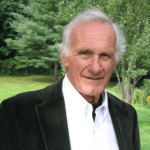 Some books and authors try to define the nature of God and Lord knows I have tried this futile exercise myself. But in reality I believe God is undefinable, beyond our ability to be adequately explained. Albert Einstein may have described this best when he was asked to provide “the ultimate explanation of the world”. His response to this unanswerable question:
Some books and authors try to define the nature of God and Lord knows I have tried this futile exercise myself. But in reality I believe God is undefinable, beyond our ability to be adequately explained. Albert Einstein may have described this best when he was asked to provide “the ultimate explanation of the world”. His response to this unanswerable question:
“I can not tell you in words, but I can play it on the violin.”
The words that resonate with me most on the nature of God come from writers who know they cannot define this great mystery. So they don’t give us the answers as much as they get us to ask the right questions, helping us shape our own personal concept of God, a vision of the Divine that is uniquely our own.
One writer of this ilk is James P. Carse, the former Director of Religious Studies at New York University, where he taught for over 30 years. Now retired, he wrote several books on God and religion that have fascinated me as much as they have baffled me. His arguments are often deeply intellectual, just beyond my reach, but he often makes points that get me scrambling for a pencil so I can underline them for future reference.

Toward the beginning of his book The Silence of God, Meditations on Prayer, Carse asks several questions that most people who consider themselves spiritual would love to know the answers to: Are prayers really answered? How is it possible that we could persuade God to give us what we want? Does God not already know what we want anyway?
Carse then proceeds to not really answer these questions, for the answers are truly unknowable. (As the title of his book suggests, God is silent.) But he does point us in the direction of the answers, allowing us to reach our own conclusions. It should be noted here that the silence of God does not sit well with Carse, who for years looked for proof of God, a sign from above that never materialized. In his words:
What I have experienced, and experienced repeatedly, is the silence of God. For many years, this was a distressing matter for me. I did not consider it an experience, but the absence of an experience.
Yet, in time, Carse comes to see the positive spiritual value of God’s silence. He writes that “in an encounter with divine reality we do not hear a voice but acquire a voice, and the voice we acquire is our own”. My personal take on this is that God enters our being and speaks through our own heart, so that our own voice echoes the voice of God.
There are many passages in The Silence of God that resonate with me and below I share a few nuggets of wisdom from Carse. I have lightly edited his words and strung them together in a loose narrative:
-
The silence of God is everywhere.
-
It is not a silence into which God has disappeared, but a silence in which God is most remarkably present.
-
God comes to us first as a listener, not a speaker. There is not a conceivable human setting in which God is not present, listening.
-
God does not come when we call. God is there, then we call.
-
We must move toward God from the heart, then God will respond. God will first wait until we do what it is possible for us to do within ourselves even if that action is exceedingly modest in scope.
-
The simplest point is that if you do speak from the heart, God listens.
-
God does not respond to us; we respond to God. God is already silent, and does not become silent when we speak.
-
To speak from the heart is to ask and to receive at the same time. Whomever you speak to from your heart you receive in your heart. You will have God in your heart—in the very act of asking.
-
It is not theology or philosophy, but only your heart that will lead you to God.
In another of his books, a series of true-life stories titled Breakfast at the Viceroy, The Mysticism of Ordinary Experience, Carse tells the story of a seeker of God from the Sufi tradition. It may well sum up his experience, as well as the experience of all of us who seek the presence of the Divine:
After a lifetime of seeking God he looked carefully and saw that he was not the seeker but the sought. In reality he was not a seeker at all; he was in flight from God. Only when he acknowledged this could he see that God was pursuing him.












